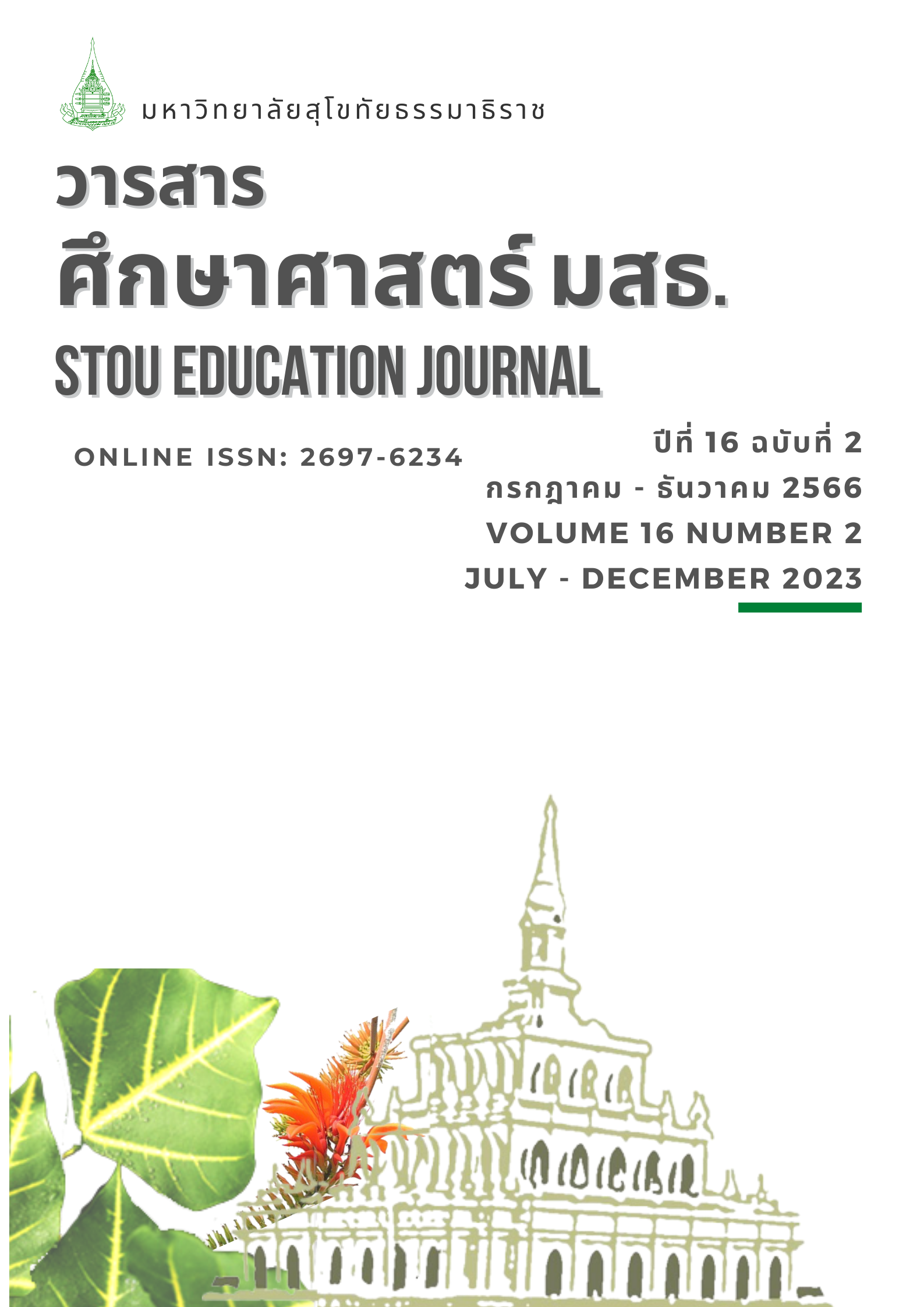Enhancing Grade-12 Students’ Scientific Conceptions in Endocrine System Using Game-Based Learning
Main Article Content
Abstract
The objectives of this research were to 1) enhance grade-12 students’ scientific conceptions in the endocrine system using the game-based learning and to 2) identify perceptions of the students towards the game-based learning. The sample of this research consisted of 100 12th graders at a large school in Bangkok, who were studying in the second semester of the academic year 2022 and voluntarily participated in this research. The instruments were a test to determine endocrine game-based learning lesson plan, scientific conceptual test in the endocrine system and a students' reflective practice on their perceptions. The data on the scientific conceptions were analyzed by grouping the responses and reported by percentage. The students' perceptions towards the learning were analyzed using means and standard deviations. The results of the research indicated as follows: After the game-based learning, the students had higher scientific understanding (SU) than the pre-learning period of all concepts. The concepts with the three highest levels included: Growth hormone (44%), Testosterone (42%) and Insulin (40%), respectively. Regarding the students’ perceptions towards the game-based learning, the majority of the students recognized that the board game on the endocrine system was beneficial to the students at a high level (M = 3.77, SD = 0.7). In addition, the students developed communication skills and peer interaction at a high level (M = 4.26, SD = 0.87).
Article Details
References
ฉัตรมงคล สีประสงค์, เชษฐ์ ศิริสวัสดิ์ และ นพมณี เชื้อวัชรินทร์. (2562). การพัฒนามโนทัศน์วิชาชีววิทยาเรื่อง ระบบต่อมไร้ท่อ และการคิดวิเคราะห์ทางวิทยาศาสตร์ของนักเรียนชั้นมัธยมศึกษาปีที่ 5 ที่ได้รับการจัดการเรียนรู้โดยใช้สมองเป็นฐาน. ศึกษาศาสตร์สาร มหาวิทยาลัยเชียงใหม่, 3(1), 1-11.
บุญชม ศรีสะอาด. (2560). การวิจัยเบื้องต้น (พิมพ์ครั้งที่ 10). สุวีริยาสาส์น.
ประภาศรี เอี่ยมสมใจ, พงศ์ประพันธ์ พงษ์โสภณ และ วีระศักดิ์ ฟุ้งเฟื่อง. (2558, เมษายน). การพัฒนาแนวคิดทางวิทยาศาสตร์ของนักเรียนในระดับชั้นมัธยมศึกษาปีที่ 5 เรื่อง ระบบต่อมไร้ท่อโดยการจัดการเรียนรู้แบบกรณีศึกษาร่วมกับเทคนิคการใช้แผนผังแนวคิด. การประชุมวิชาการระดับชาติ มหาวิทยาลัยรังสิต. https://rsucon.rsu.ac.th/files/proceedings/nation2015/G5-05.pdf
ปาริชาต ชิ้นเจริญ, สุรีย์พร สว่างเมฆ และ มลิวรรณ นาคขุนทด. (2565). การพัฒนาบอร์ดเกมที่ส่งเสริมความฉลาดรู้ด้านระบบนิเวศ สําหรับนักเรียนชันมัธยมศึกษาปีที่ 4. วารสารศึกษาศาสตร์ มสธ, 15(1), 85-99.
รัชกร เวชวรนันท์, เอกรัตน์ ทานาค, ชาตรี ฝ่ายคำตา และ สุรเดช ศรีทา. (2562, มีนาคม). การพัฒนาทักษะการสร้างคำอธิบายเชิงวิทยาศาสตร์ผ่านการจัดการเรียนร้แบบสืบเสาะหาความรู้โดยใช้เกมเป็นฐานของนักเรียนระดับชั้นมัธยมศึกษาปีที่ 4. การประชุมวิชาการเสนอผลงานวิจัยระดับบัณฑิตศึกษาแห่งชาติ ครั้งที่ 20. https://app.gs.kku.ac.th/gs/th/publicationfile/item/20th-ngrc-2019/HMO26/HMO26.pdf?fbclid=
IwAR2j1dyUwYRgI5bpAb6lykscVgNyeVGmTHoFtoJQ_60qgaIGDF8PZwKPfyI
ศตานันท์ แก้วศรี. (2563). การออกแบบและพัฒนาเกมกระดาน เรื่อง ระบบภูมิคุ้มกัน. [วิทยานิพนธ์มหาบัณฑิต ไม่ได้ตีพิมพ์]. มหาวิทยาลัยทักษิณ.
สถาบันส่งเสริมการสอนวิทยาศาสตร์และเทคโนโลยี. (2566). คู่มือครู รายวิชาเพิ่มเติม ชีววิทยา ชั้นมัธยมศึกษาปีที่ ๖ เล่ม ๕. สกสค. ลาดพร้าว.
สุนันทา สุดใจ และ นิวัฒน์ ศรีสวัสดิ์. (2564). ผลของการจัดการเรียนรู้วิทยาศาสตร์สืบเสาะแบบเปิดโดยใช้การ์ด เกมดิจิทัล เรื่อง การสังเคราะห์โปรตีนที่มีต่อแรงจูงใจในการเรียนรู้ชีววิทยา ของนักเรียนชั้นมัธยมศึกษา ตอนปลาย. วารสารศึกษาศาสตร์มหาวิทยาลัยขอนแก่น, 44(4), 68-83.
อรรถเศรษฐ์ ปรีดากรณ์. (2557). การออกแบบบอร์ดเกมการศึกษา เรื่อง วงสีธรรมชาติ สำหรับนักเรียนชั้นประถมศึกษาปีที่ 6. [วิทยานิพนธ์มหาบัณฑิต ไม่ได้ตีพิมพ์]. มหาวิทยาลัยศรีนครินทรวิโรฒ.
Butsarakam, N., & Yasri, P. (2019). The Effectiveness of the female reproductive (ferep) board game on 10th gradestudents’ conceptual understanding and attitudes towards the learning of the menstrual cycle. Scholar. Human Sciences, 11(1), 248-248.
Cavalho, J. C. Q. D., Beltramini, L. M., & Bossolan, N. R. S. (2019). Using a board game to teach protein synthesis to high school students. Journal of Biological Education, 53(2), 205-216.
Chong, C. S. (August, 2019). Types of board games for the ELT classroom – Part 2. English Teaching Professional. Pavilion Publishing and Media Ltd. https://www.etprofessional.com/types-of-board-games-for-the-elt-classroom-part-2#
Ezezika, O., Fusaro, M, Rebello, J. & Aslemand, A. (2021). The pedagogical impact of board games in public health biology education: The bioracer board game. Journal of Biological Education. 57(2), 331-342.
Haidar, A.H. (1997). Prospective chemistry teachers’ conceptions of the conservation of matter and related concepts. Journal of Research in Science Teaching, 34(2), 181-197. http://www.susted.com/wordpress/content/board-games-as-educational-tools_2021_05
Jacobson, W. J., & Bergman, A. B. (1999). Science for children a book for teachers. (3 rd ed.). Prentice Hall.
Jones, S. M., Katyal, P., Xie, X., Nicolas, M. P., Leung, E. M., Noland, D. M., & Montclare, J. K. (2019). A ‘KAHOOT!’approach: The effectiveness of game-based learning for an advanced placement biology class. Simulation & Gaming, 50(6), 832-847.
Kaur, A.W. (2021). Signal: A neurotransmission board game. Journal of Undergraduate Neuroscience Education, 20(1), A18–A27.
Lu, Y. L., & Lien, C. J. (2020). Are they learning or playing? Student’s perception traits and their learning self-efficacy in a game-based learning environment. Journal of Educational Computing Research, 57(8), 1879-1909.
Ningsih, R. D., Jamilah, Z., & Rija, M. (2023). Bioedutainment-based jenga board game: A learning media development for human digestive system material. BIOSFER: Journal Tadris Biologi, 14(1), 53-65.
Pope, L. (May, 2021). Board games as educational tools. The Journal of Sustainability Education, 25, 1-26.
https://www.susted.com/wordpress/content/board-games-as-educational-tools_2021_05/.
Tsai, J. C., Cheng, P. H., Liu, S. Y., & Chang, C. Y. (2019). Using board games to teach socioscientific issues on biological conservation and economic development in Taiwan. Journal of Baltic Science Education, 18(4), 634-645.
Tyler, R. (2002). Learning for understanding in science: Constructivism/conceptual change model in science teacher education. Science Education, 80, 317-341.


